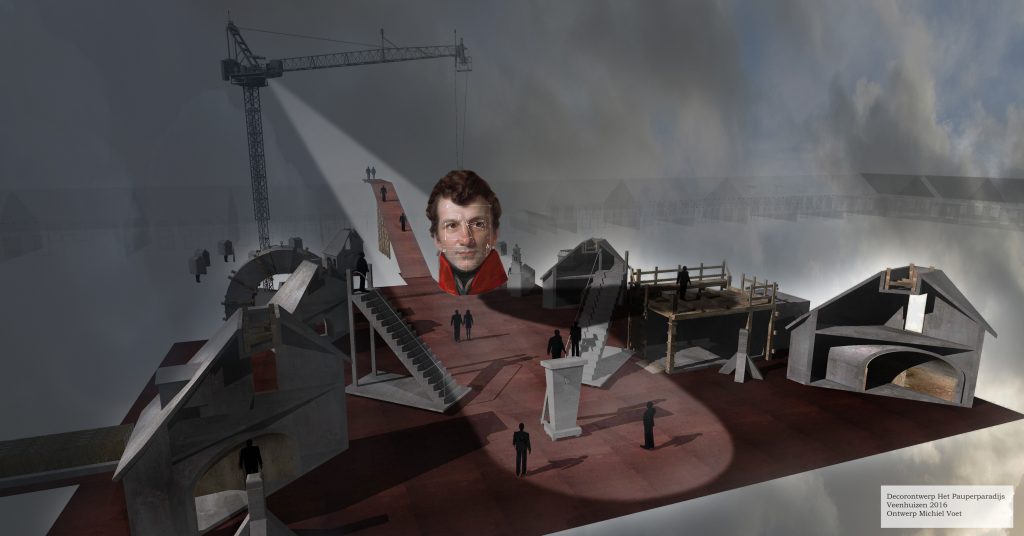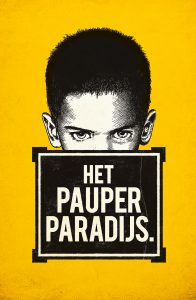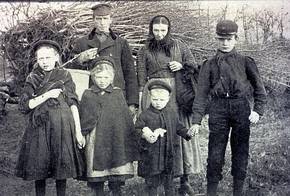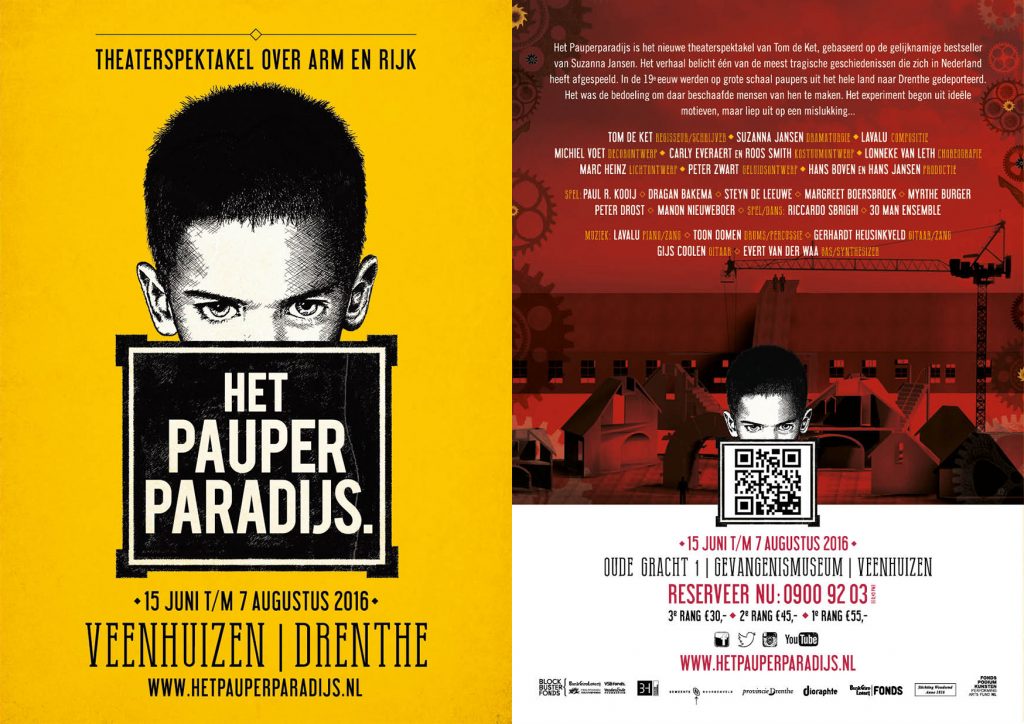The garish signs KEUKENHOF keep on whizzing past café Foolish Business, on a very sticky Tuesday morning. Hordes of tourists throng behind them, ready to spend money on picturesque pictures and unique experiences. My interest today is in the opposite, the desolate 19the century colonies in Drenthe, then called 'Dutch Siberia'. To me, Drenthe is known as ' a cyclist's paradise' but writer Suzanna Jansen wrote the 2008 bestseller The Pauper's Paradise about, in which she meticulously traced her family's history back five generations.
She is wearing a summery blue dress and is in transit to the 'crime scene' of our conversation, Veenhuizen, to drive past her 'favourite places' with RTV Drenthe. This is a tad ironic, since she knows Drenthe mainly through her ancestors, who lived and died under miserable conditions in the colonies.
15 June 2016 goes there in Veenhuizen theatre show The Pauper's Paradise premiered in the courtyard of the Gevangenis Museum, about 'one of the most dramatic hidden histories in the Netherlands'.
As many as 1 million Dutch Descend from Veenhuizen customers[hints]From the registers reveals that Ruud Lubbers, Geert Mak and Alexander Pechtold, Thea Beckmann, Anton Pieck and Bert Haanstra, among others, are related to paupers from the 19th-century poor colonies[/hints]. Vanaf 1823, toen het gesticht gebouwd werden, zijn duizenden Nederlandse paupers naar Veenhuizen gestuurd voor heropvoeding. Wat ooit begon als een idealistisch project waar gezinnen en weeskinderen vrijwillig aan een beter leven konden bouwen (lees: spitten) eindigde als een brandmerk voor draaideurlandlopers die door hun verblijf in Veenhuizen nooit meer in staat waren elders een zelfstandig bestaan op te bouwen.
8 jaar geleden werd ‘het Pauperparadijs’ een bestseller. Hoe kijk je op de afgelopen jaren terug?
‘Dat zoveel mensen het gekocht en gelezen hebben is voor mij onwezenlijk. Wat ik duidelijk heb willen maken is dat je afkomst nog altijd een grote factor is bij je mogelijkheden in de toekomst. Dat willen we vandaag de dag liever niet weten. We denken namelijk liever dat iedereen alles kan worden, wat op basis van zijn capaciteiten mogelijk is. Dat is niet waar. Ik krijg bijvoorbeeld veel reacties van mensen die door de toegenomen welvaart in de jaren ‘60 en ‘70 als eerste in hun familie zijn gaan studeren. Ondanks hun goede positie zijn ze altijd blijven voelen waar ze vandaan komen. En dat heeft hun mogelijkheden beperkt. Ze herkennen hun verhaal in mijn boek.
Ik had nooit gedacht dat mijn boek een bestseller zou worden, ik vind het heel bijzonder dat zoveel mensen het boek lezen en er door geraakt worden. Ik krijg er nog steeds wekelijks mailtjes over van mensen, na acht jaar, die me vertellen hoe het ze geraakt heeft.’
Is het niet gek om aan een boek over armoede geld te verdienen?
‘Absoluut. Maar alles is gek aan hoe het gelopen is. Ik heb vier jaar van mijn leven gewerkt aan dit boek, in mijn eentje, in een kelder zonder daglicht. Ik was bang dat niemand het zou gaan lezen.’
Wat geef jij nu door aan de volgende generatie?
‘Ik kom zelf niet uit een arm gezin, maar heb de ‘dubbeltjesmentaliteit’ onbedoeld wel van mijn moeder meegekregen. Ik denk niet dat mijn dochter er nog last van zal hebben. Dat hoop ik tenminste. Ik hoop dat ik, door deze geschiedenis boven tafel te tillen, hem onschadelijk heb gemaakt. Mijn dochter is hier overigens helemaal niet mee bezig. Ze is 14 en houdt zich bezig met dingen die voor een 14-jarige belangrijk zijn. En zo moet het ook.’
Wat mij destijds raakte aan jouw boek, was hoe ‘ hard’ we vroeger tegen armoede aankeken. Dat we het zagen als een lotsbestemming waar je niet aan kon morrelen.
‘Het boek gaat ook over vandaag. Nog altijd zijn we geneigd mensen die arm zijn of hulp nodig hebben te zien als losers die het aan zichzelf te wijten hebben. Je hoeft toch niet ongeschoold te zijn/verslaafd te blijven/in de schulden te komen/naar Europa te trekken als je geen visum hebt? Terwijl pech ieder mens kan overvallen. En net als vroeger gaapt er een enorm gat tussen de beleidsmakers die vanuit goede intentie de armoede willen pakken en de mensen waar het om gaat.
Natuurlijk, armoede heeft nu vaak een ander gezicht. Er bestaan nu uitkeringen en maatschappelijk werk. Je hebt in Nederland praktisch altijd wel een dak boven je hoofd en te eten. Maar de schaamte voor armoede en de vooroordelen zorgen nog altijd voor een sociaal isolement.
Wist dat je dat er bij mij in de buurt, hier in Amsterdam, een gaarkeuken zit voor daklozen , gerund door de nonnetjes van moeder Theresa uit Calcutta?’
Krijg je er geen genoeg van dat je altijd weer met Het Pauperparadijs wordt geassocieerd?
‘Ik heb het verhaal al vaker verteld maar het is nooit routine. Ik wil het vertellen, want het blijft belangrijk. Misschien ben ik wel een soort missionaris.’
Wat is jouw betrokkenheid bij dit theaterspektakel?
‘Veel schrijvers bemoeien zich er niet mee als er van hun werk een film of voorstelling wordt gemaakt. Maar voor mij was de voorwaarde juist: als ik eraan mee mag werken. Gelukkig hoefde ik dat niet eens te zeggen. Tom de Ket wilde mij er graag bij hebben. We zijn een paar jaar bezig geweest om de voorstelling werkelijk van de grond te tillen. Artistiek, maar vooral ook zakelijk.
Ik heb er geen moeite mee om mijn eigen tekst los te laten. Integendeel: ik vind het een feest om te zien wat anderen op basis van dit verhaal creëren. Daarnaast is het een fijne afwisseling met het werken aan mijn volgende boek.
De voorstelling heeft drie lijnen, sommige wat explicieter dan in het boek, maar theater is een heel andere vorm. Je hebt beeld, kleur, geluid, beweging, allemaal elementen die je in een boek niet kunt inzetten. Maar in woorden op papier kun je weer veel meer informatie kwijt, en je bent niet aan een bepaalde tijd gebonden. Daarom hebben we gekeken wat wij de essentie van het verhaal vonden, en daarop de scenes gebouwd. Tom de Ket heeft het script geschreven, en samen hebben we de verhaallijn bedacht.
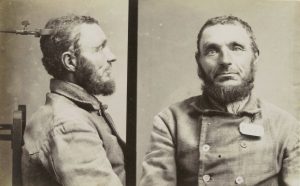
Het is nadrukkelijk geen bewerking van het boek maar er op gebaseerd. Omdat ik in mijn boek vijf generaties beschrijf hebben we gekozen voor een stel, Cato Braxhoofden en Teunis Gijben, mijn betbetovergrootouders, die elkaar in Veenhuizen hebben leren kennen. Naast de tragische liefdesgeschiedenis van de protestantse bewakersdochter en de katholieke pauperzoon laten we de oprichter van de koloniën, Johannes van den Bosch, aan het woord. Hij heeft zich zijn hele leven hard gemaakt voor zijn idealen om de landlopers en verstotenen uit de samenleving een toekomst te bieden maar in de praktijk pakte een aantal van zijn ideeën rampzalig uit. De mensen die in zijn gestichten terecht kwamen, konden er vaak niet meer weg. ‘Veenhuizen’ was een stempel voor het leven.
In werkelijkheid was Teunis de zoon van vrijwillig aangekomen kolonisten. Maar omdat we het ook belangrijk vonden om het verhaal van de gedwongen deportaties van wezen te vertellen hebben we hem omgeschreven tot wees uit het Amsterdamse weeshuis. Die wezen werden allemaal in 1826 midden in de nacht uit het Aalmoezeniersweeshuis weggehaald, ze hadden vaak gewoon nog familie, ouders zelfs, in de stad. Maar de kolonie had mensen nodig.’
Waarom noemen jullie het een theaterspektakel? Dat schept verwachtingen.
‘Die gaan we inlossen. We spelen op de plek waar de paupers van vroeger daadwerkelijk in dat gesticht hebben rondgelopen, nu de binnenplaats van het Gevangenismuseum. Alleen al die omgeving heeft een enorme impact. En dat is alleen nog de entourage. We hebben een enorm speelvlak met een bewegend decor van beeldend kunstenaar Michiel Voet, we hebben zeven acteurs en een danser, een band met speciaal voor de voorstelling gecomponeerde muziek door het jonge talent Lavalu, een koor van dertig mensen dat tegelijk in choreografieën het decor aanvult, en een ijzersterk script. Al die elementen samen vertellen het verhaal. Spektakel dekte de lading van de totaalervaring die het wordt gewoon beter.’
Een gesamtkunstwerk dus?
‘Ja, dat is het.’
Het pauperparadijs is van 15 juni 2016 t/m 7 augustus te zien in Veenhuizen.
Voor meer informatie en kaarten zie: www.hetpauperparadijs.nl
